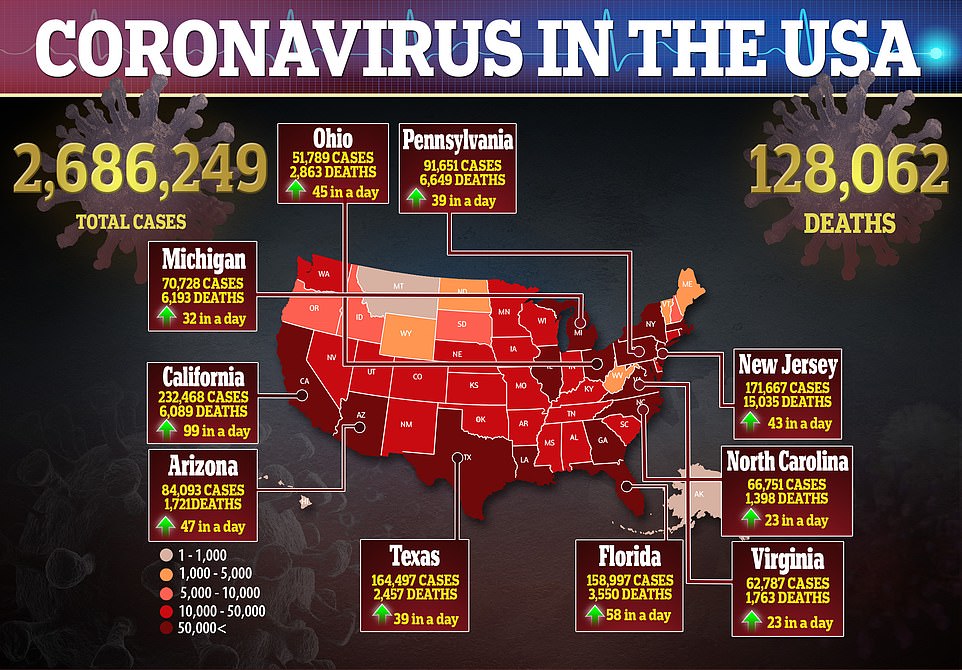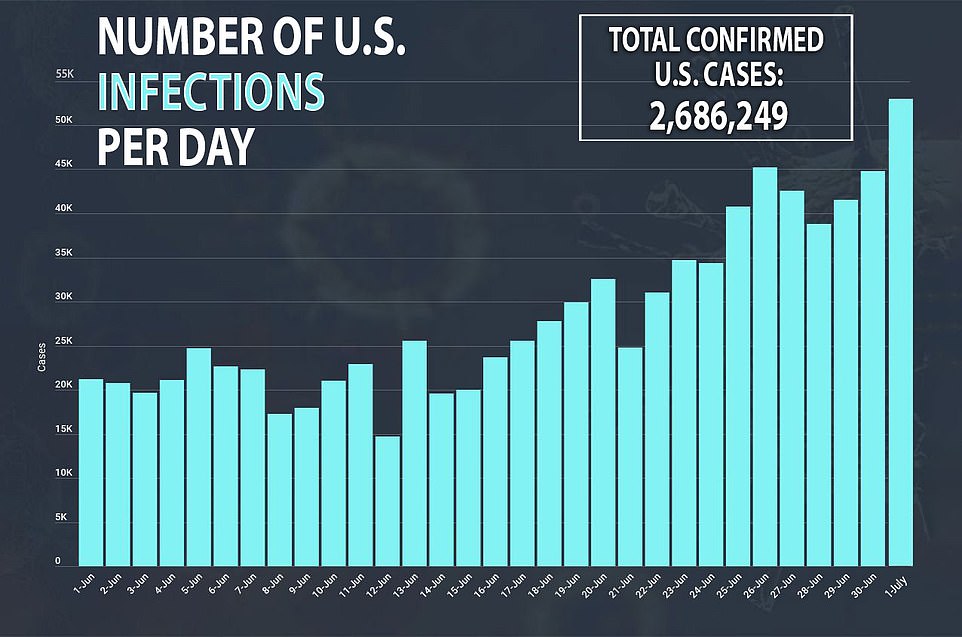Florida recorded 10,109 new COVID-19 cases on Wednesday, the highest single-day increase for the state.
There are now more than 169,000 confirmed cases in Florida.
An additional 68 deaths were reported Wednesday, bringing the total number of COVID-19 fatalities to 3,718.
Florida Gov. Ron DeSantis (R) has taken some steps to try to slow the spread of the virus, including closing bars and some beaches.
While he has not issued a statewide mask mandate, several localities require the use of masks in public.
Experts attribute the rise in cases in Florida and other states to reopening businesses too quickly after a weeks-long shutdown and lax following of social distancing recommendations.
Florida is one of the states being hit hardest by COVID-19 right now, making up about 20 percent of new cases in the U.S.
Texas, Arizona and California area also reporting record-high daily case increases.
The US has seen a record 52,000 new COVID-19 cases within 24 hours on Wednesday, according to data from Johns Hopkins University.
The surge marks a new one-day record of infections as states across the country reopen.
According to the tracker, there were 52,898 new cases over the 24 hours to Wednesday evening.
The total number of COVID-19 cases in the US was 2,686,249 early Thursday morning and the number of deaths stood at 128,062.
On Wednesday alone Texas broke its daily record and recorded 8,076 new cases, which is nearly 1,000 more than the day prior.
The startling spikes in cases have forced states such as Texas, California and Florida to buckle down and halt their reopenings.
On Wednesday California Gov. Gavin Newsom ordered all bars, indoor restaurant operations and movie theaters to shut down immediately in most parts of the states, nearly three weeks after the state’s bars, stores, restaurants, and salons opened for the first time following a three-month lockdown.
Since then, the number of COVID-19 cases have begun to rise again, increasing nearly 50 percent over the last two weeks, with a 43 per cent spike in hospitalizations.
Contrary to the data, President Trump insisted the virus will simply disappear during an interview with Fox Business on Wednesday.
‘We’re headed back in a very strong fashion … And I think we’re going to be very good with the coronavirus. I think that at some point that’s going to sort of just disappear. I hope,’ he claimed.
Tuesday’s new case increase of more than 44,000 infections marked a jump of more than 80 percent compared to a single day increase reported just two weeks ago, according to a Reuters tally.
Steep national increases in cases are driven by a handful of states, eight of which hit record-high new cases Tuesday. Those states are Alaska, Arizona, California, Georgia, Idaho, Oklahoma, South Carolina and Texas.
Top US infectious disease specialist Dr Anthony Fauci warned during a Tuesday Senate hearing that daily infections could soar to 100,000 ‘if this does not turn around’ and, while he declined to predict a specific number of fatalities, he worries the death toll in the US could reach ‘disturbing’ heights.
Public health experts warn that, although the number of people dying each day is down significantly, these increases typically lag behind case increases, with one recent study estimating a 17-day delay.
Amid alarming coronavirus case increases, states are beginning to roll back their reopenings.
Arizona is still the most worrisome state.
New daily infections there have more than doubled in the past week.
Arizona’s Republican governor Doug Ducey on Monday all bars, gyms, movie theaters and water parks to close for at least 30 days.
The state’s cases increased 29 percent in the last week after reporting several record daily increases in cases.
Most Arizona bars and nightclubs opened after the governor’s stay-at-home and business closure orders were allowed to expire in mid-May.
Tuesday, Delaware ordered some of its beach towns shut down their bars after a recent spike in cases.
More than 11,500 people in Delaware have now tested positive for coronavirus and the state announced 95 new cases Tuesday.
Over the weekend, 270 new cases were diagnosed.
Delaware Governor John Carney’s order was met with protests in at least one town.
Citizens in Dover took to the streets brandishing signs that read ‘enough is enough.’
The re-closures come just before the July 4 weekend, which would have been a boon to businesses, especially in beachfront towns, where bars will now have to shut their doors.
Like Delaware, Alaska’s total number of cases is low compared to more populous states like California or Texas, but the recent uptick is disturbing.
On Tuesday, 48 new cases were confirmed in the sparsely populated state, bringing the total to 544 (including 144 visitors).
It’s the largest single-day increase in cases in the state to-date, and includes 12 non-residents. Fourteen Alaskans have died of coronavirus.
Alaska was among the last states to be hit by coronavirus. Only Hawaii and US territories like Guam and the Virgin Islands currently have fewer cases.
In the past three weeks, as cases have ticked up in the state, Alaska has stepped up screening and testing at its airports.
Last week, about 5,000 travelers were tested.
Airport screening and testing has resulted in 45 positive tests so far.

